Beer's Principles For Good Government in the COVID-19 Crisis
Jeremy Gross
Introduction
As of this writing, there are 1.75 million confirmed cases of the COVID-19 virus, and 105,000 people are confirmed to have died of the virus. Many statistics and maps about the COVID-19 pandemic are available online from Johns Hopkins University. But looking at the rates of infection in various countries throughout the world, we know that those nations with accurate reports are reporting exponential growth until adequate measures are taken, and that many authoritarian regimes, such as Brazil and Russia and Hungary, are seriously underreporting the number of cases. Moreover, there are not the means to test in the Global South, so the numbers there could be considerably higher than reported.
In Britain and the USA, the response to the crisis would be farcical if it weren’t so cruel. Denialism during the crucial weeks between the outbreak of the crisis and when it started to kill people in those countries in large numbers meant that, after weeks of bluster, these economic powerhouses of late capitalism are scrambling to do damage control for how they have responded to the crisis; a damage control that barely addresses the health crisis, and instead focuses on the crisis of legitimacy incited by the miserable way their regimes have failed to protect their own citizens.
The always-buffoonish Boris Johnson has undergone the journey from a denialist vigorously shaking hands with people infected with the virus, to a junk-science optimist peddling bad theories of herd immunity, to facing his own infection with mock bravado, to gasping for breath in intensive care. This Chaplainesque progression would make a sitcom gag writer blush. We can easily imagine Donald Trump or Jair Bolsonaro following a similar trajectory.
This crisis of legitimacy is showing the edges of neoliberal hegemony where the fabric of neoliberalism is fraying and unraveling. For decades, the exterminist assumptions implicit in neoliberal hegemony—that the poor are responsible for their poverty, that lack of access to healthcare is a temporary inconvenience rather than a flaw in the system, that the staggering numbers of those incarcerated or in concentration camps for undocumented people can be blithely ignored in any reckoning of whether these societies are just or fair—these assumptions, in the wake of the crisis, are becoming explicit. And the cruelty and ugliness of these explicit assumptions are too much to bear.
And yet, in the face of this catastrophic vaccum where leadership ought to be, we have silence from the opposition within these governments. The dominant parties propose that hundreds of thousands die under their victory conditions and the opposition parties try to means-test as meagre a solution as their corporate masters will allow them to push for. Never in my lifetime has there been such a bold silhouette of what the proper left solution would be if there were actual left parties within proximity of power.
Therefore, let us trace that silhouette, using Stafford Beer’s rubric, 5 Principles For The People Towards Good Government. 5 Principles For the People For Good Government, written 1972, reprinted in 2nd ed. Brain of the Firm, by Stafford Beer, pp. 291-305. All illustrations by Stafford Beer.
Government is the people’s help
Every day, President Trump holds a press conference and offers a stream of consciousness rant based on whatever he saw on Fox News or read on Breitbart that day. His cabinet members rush out to make passionate defenses of whatever they assume is the President’s most recent position, and the situation in the UK is similar, with Boris Johnson clowning his way through what little scrutiny the press tries to offer. At the regional level, governors and mayors vary in their approach, region by region, offering a full spectrum of possible approaches, from rigorous lockdown enforced by police, to open encouragement that people congregate in large groups. In the USA, ten millions of people have lost their jobs in the last two weeks, and their rent or mortgage was due on the first of the month. Homeless shelters are being shut, with city officials helpfully letting them sleep in open-air car parks with six-by-six grids marked out to help them with social distancing.
What the governments are doing is mostly incomprehensible. There is no coherent, unified plan. People do not have the sense that the government is there to help them. Their problems are for them to solve themselves. Their burdens are their own.
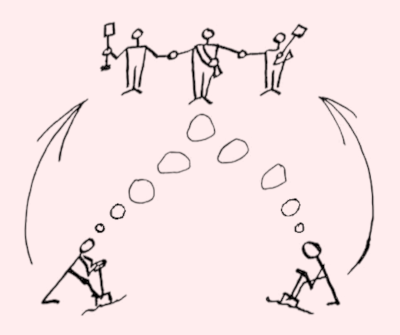
What if, instead, the people had a mechanism that enabled them to think of what
to do, and how to act together to do it? What if the best scientists were
enabled to inform the people through trusted channels, and online networks as
broad and powerful as Facebook or Twitter were mobilized as forums where the
people could coordinate with each other to the best of our abilities to save all
of us from the worst effects of the virus? What if there were a way for the
government to act as the people’s help in this crisis? The wishes of the people
would be made known to the government at all times, using federated network
technology that belonged to the people, and the government would respond in real
time to people’s needs.
To help means helping now
People are dying right now, in large numbers. Last week, the death rate in New York City in one day surpassed the annual murder rate in the city for each of the last seven years. Statistics taken from Johns Hopkins as cited above, and New York Crime Rates 1960-2018. And yet, we have seen only a small fraction of the number of deaths that are going to happen in this crisis. Scientists have been very hesitant to predict what the global death toll for the virus will be, but we are seeing the death rate for the virus increase as the statistics shift from coming from Wuhan to coming from Western Europe and the USA. Among us today are living people who are going to die of this virus. They are everywhere, and their numbers depend upon how rapidly help will arrive for their communities.
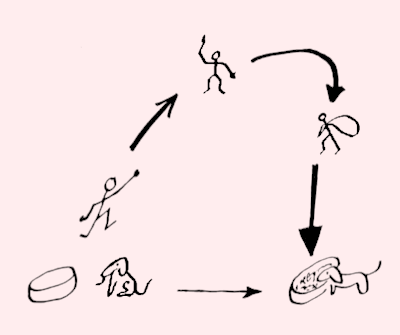
And yet, the relief offered includes tax breaks and delayed tax deadlines. Where
some of the social democratic countries of Europe have offered actual money for
relief, money that has already arrived, in the capitalist centers of the
Anglophone world, the UK and the USA, there are vague promises mired in
means-testing and other confusing criteria, along with considerable red tape.
Life-saving supplies sit on airport tarmacs, on trucks and trains, with the
federal governments, states, municipalities, and private bidders bargaining over
who will get them. This is resulting in endless delays at a time where these
items are desperately needed. We are already seeing people die because they are
not getting the supplies they need in time to save their lives.
We live in a world where, even in developing nations, people have smartphones. There are billions of people on Facebook and Twitter. It is not fanciful to believe that we could have federated networks in place that could provide instantaneous contact with people in the government who provide help, and immediate responses to those who seek this help, resulting in the fastest possible life-saving action. We have the Internet already in place. We could be using existing infrastructures to provide help that helps right now.
The road to help has signposts
When the money runs out for households in the face of this crisis, where are they going to find relief? At a time of social distancing, where can people go, in person or online, to find the help that they need? Last week in New Jersey, there was a call by the governor for COBOL programmers, The unemployment benefit system in New Jersey was coded onto mainframes using Structured COBOL decades ago. because the unemployment system was so overwhelmed by new requests for unemployment relief that it crashed the mainframe computers that normally run the state unemployment system. People are in despair. Meanwhile, petty officials hide and hoard the relief that people need to save themselves. There is endless bureaucracy, and without an end to the red tape, there is little hope that there will be any relief to be had. People have questions but no answers.
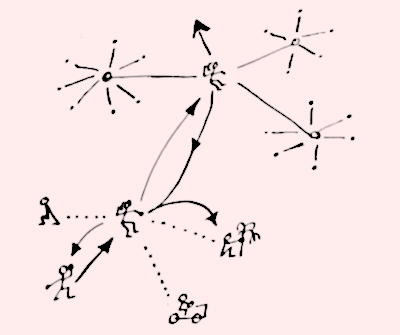
What if you knew whom to turn to? What if you knew who was designated to be the
first person you could reach out to for help? That person had a few people and
households for whom they were the designated person to go to for help, but they
also knew that if they were overwhelmed, they were part of a supportive network
that scaled up to the whole society. One straight link would go higher up, with
the links going all the way to the President or the Prime Minister. These links
would be two-way, providing help coming down the chain as requests went up the
chain. These chains would be scalable and load-balanced, growing during
emergencies, and shrinking during times of no emergency. Officials in the
government would exist whose only job is to provide help, and to give answers,
with minimal paperwork. The people cannot eat paper.
Help is a name and a face
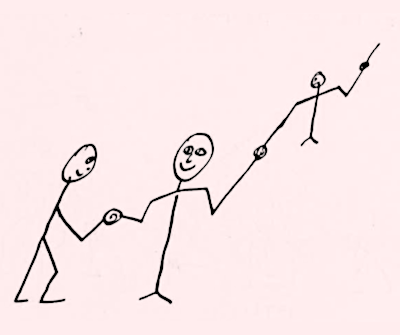
In the absence of good information making its way to the people, conspiracy
theories are abounding. Angry, frightened people are blaming faceless
individuals who may or may not exist for their troubles. While the people are
suggesting possible solutions, or at least offering ideas that could help, they
are being told, “It cannot be done”. Or worse, they are being blamed for their
own misfortunes, or given to believe that their misfortunes are their own bad
luck.
What if the people in government who are there to help took direct personal responsibility for themselves and their actions? What if the answer to cries for help were “I will do it, or I know who can”?
In a crisis, lots of people want to help. There are people in the government who really want to help people in this crisis. What if they had the opportunity and the time to know the people whom they are proud to help? What if, well before there were a crisis, the people involved all knew each other and trusted each other? So that, in the midst of the crisis, they were able to move rapidly to help, or provide access to help that they themselves might not be able to provide?
The future starts today
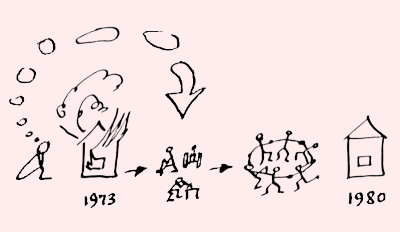
With bad leadership, the whole society is perpetually in a crisis. That leaves
everyone busy grabbing whatever they can. The inability to plan leaves people
facing the same old problems later on. Despair sets in, and along with it the
assumption that things cannot change, that they will always be as bad as they
are now. When a real crisis comes along, the slow crisis of the status quo is
overwhelmed by need, but without the optimism that it is possible for change to
make it easier to handle the crisis.
Imagine if we had hope for a better future, materially and psychologically, and we were encouraged to collaborate on building that better future, knowing that the better future we all share is just beginning. What if societal decisions were made with the assumption that the needs of those two generations from now would need to be met with the solutions we provide? What if we were all encouraged to be co-creators of a better society?
While living conditions have worsened in the USA and UK in the last few decades, these deteriorating conditions are not inevitable nor are they inescapable. We have the technology, the science, the organizational skills, and the will to provide the kind of society that we want for ourselves. The role of government in this crisis is to help the people understand the options. Then the people must decide how to navigate through this crisis.
Conclusion
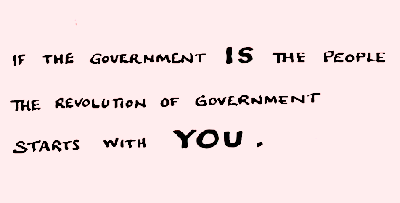
In the USA and the UK, we are drowning in the propaganda of capitalist realism,
and it severly exacerbates the crisis we find ourselves in. In previous crises,
things have gone back to the status quo of neoliberal late capitalism because no
other way of being has penetrated the thick wall of ideology and propaganda that
shapes this awful way of being as somehow normal. But in a crisis of this
magnitude, there is no going back to normal afterwards, because once the shades
of propaganda fall away and we see the world as it really is, it becomes clear
that what we had before was anything but normal.
We must have the courage to demand that if we must have government, that it act as the people’s servant, not their master.